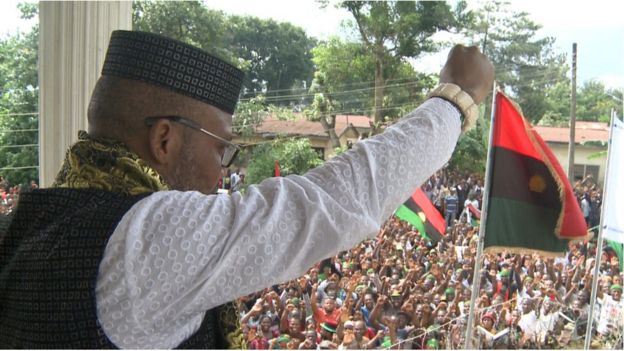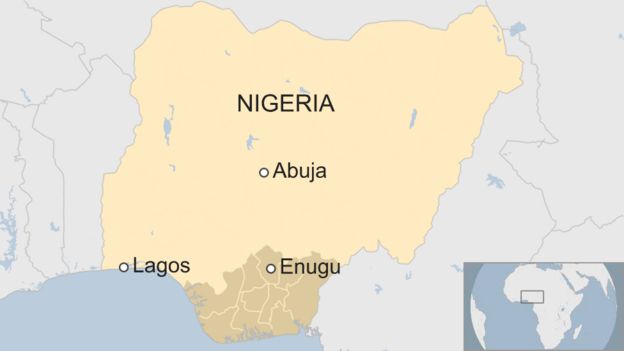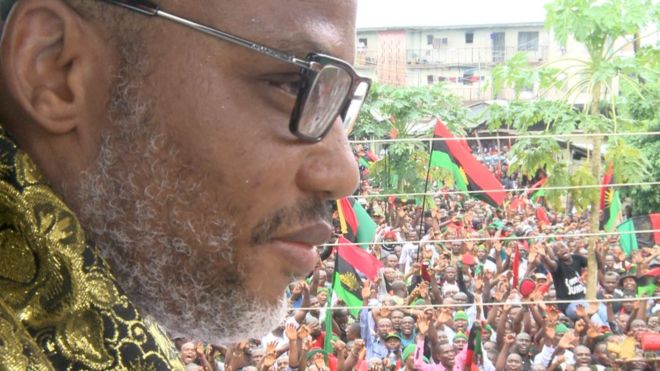'Nigeria treats us like slaves' - but is Biafra the answer?
Hidden high in the luscious, green hills of Enugu in south-east Nigeria, down a beaten track - under a sign that says leprosy colony - is the Biafran war veterans' camp.
Like its location, residents there are verging on obscurity.
Four old men sitting on parallel wooden benches, propped up on metal crutches - swaying and chanting along to an old battle song.
They fought and were crippled in the bloody Biafran war.
"We went to that war with nothing, we went empty-handed," says Francis Njoku. "Some held machetes, some had sticks. They [Nigerian forces] had machine guns."
Mr Njoku, now 69, lost his kneecap in a gun battle.
It was a desperate fight for survival. But it ended in a ceasefire and Biafra became part of Nigeria again.At the end of the war, the Nigerian head of state General Yakubu Gowon declared there was "no victor, no vanquished" - this became the motto of reunification.
But for many people in the south-east, the reunion has been an uneasy one.
"If you come to Igbo-land you can see there is no development here," says Mr Njoku.
It's a common perception we heard many times here - that Igbo people are marginalised in a Nigeria that only serves the interests of the two other main ethnic groups - the Hausa and Yoruba.
Although government statistics show that poverty rates are far higher in the north than other regions, there are some genuine complaints.
In almost 30 years of democracy, Nigeria hasn't had an Igbo president.
"We still need [Biafra]," says Mr Njoku. "Nigerians are maltreating us - like slaves."
It's a strong sentiment and one that a new crop of activists is playing on. Among them a new leader has emerged.
Despite bail conditions saying he cannot speak to the press, Nnamdi Kanu agreed to our request for an interview.
We were to meet in his father's compound in the south-eastern town of Umuahia - the last bastion of the Biafran state before its surrender.
As we approached Umuahia, we were greeted by a large crowd that had seemingly been organised for our benefit.
We had arranged the interview the afternoon before and in that time he had gathered up to 1,000 people - they surrounded his father's compound waving huge striped flags, carrying the Biafran symbol of a half-rising sun, and foghorns - chanting their support under the pouring rain.
Senior government and police officials live a few hundred metres away but no attention was paid to their presence.
The cheers escalated to roars as they spotted Mr Kanu emerge onto the balcony of the house with his fists raised.
 He has gold and black cloth wrapped around his shoulders and a matching gold cap on his black suede designer loafers. "They're calling for Biafra," he says softly, with a smile.
He has gold and black cloth wrapped around his shoulders and a matching gold cap on his black suede designer loafers. "They're calling for Biafra," he says softly, with a smile.
All of this for a cause that has him facing treason-related charges in court.
"Basic human development, basic economic development, basic social development, can no longer be attained for the simple reason that there exists in the polity mutual suspicion, mutual hatred, mutual resentment," he says.
"So the best thing to do is to separate."






No comments